Entrepreneurship Report: Joe Woods' Entrepreneurial Journey and Impact
VerifiedAdded on 2020/10/22
|15
|3994
|371
Report
AI Summary
This report provides a comprehensive case study of Joe Woods, a successful entrepreneur who established an IT firm to offer digital payment solutions. It explores various types of entrepreneurial ventures, including small business, social, scalable start-ups, and large-scale enterprises, along with their respective typologies. The report analyzes the similarities and differences between these ventures, highlighting their impact on the UK economy, particularly through employment creation, infrastructure development, and tax revenue. Furthermore, it discusses the significance of small businesses and start-ups in driving economic and social development, especially in the context of Brexit. The analysis includes statistical data on the contribution of micro, small, and medium enterprises (SMEs) to the UK economy, emphasizing their role in job creation, poverty reduction, and overall economic growth. The report also explores the effects of economic factors on SMEs, including their impact on local, regional, and national levels, and the influence of government policies on fostering new ventures.

Entrepreneurship
Paraphrase This Document
Need a fresh take? Get an instant paraphrase of this document with our AI Paraphraser
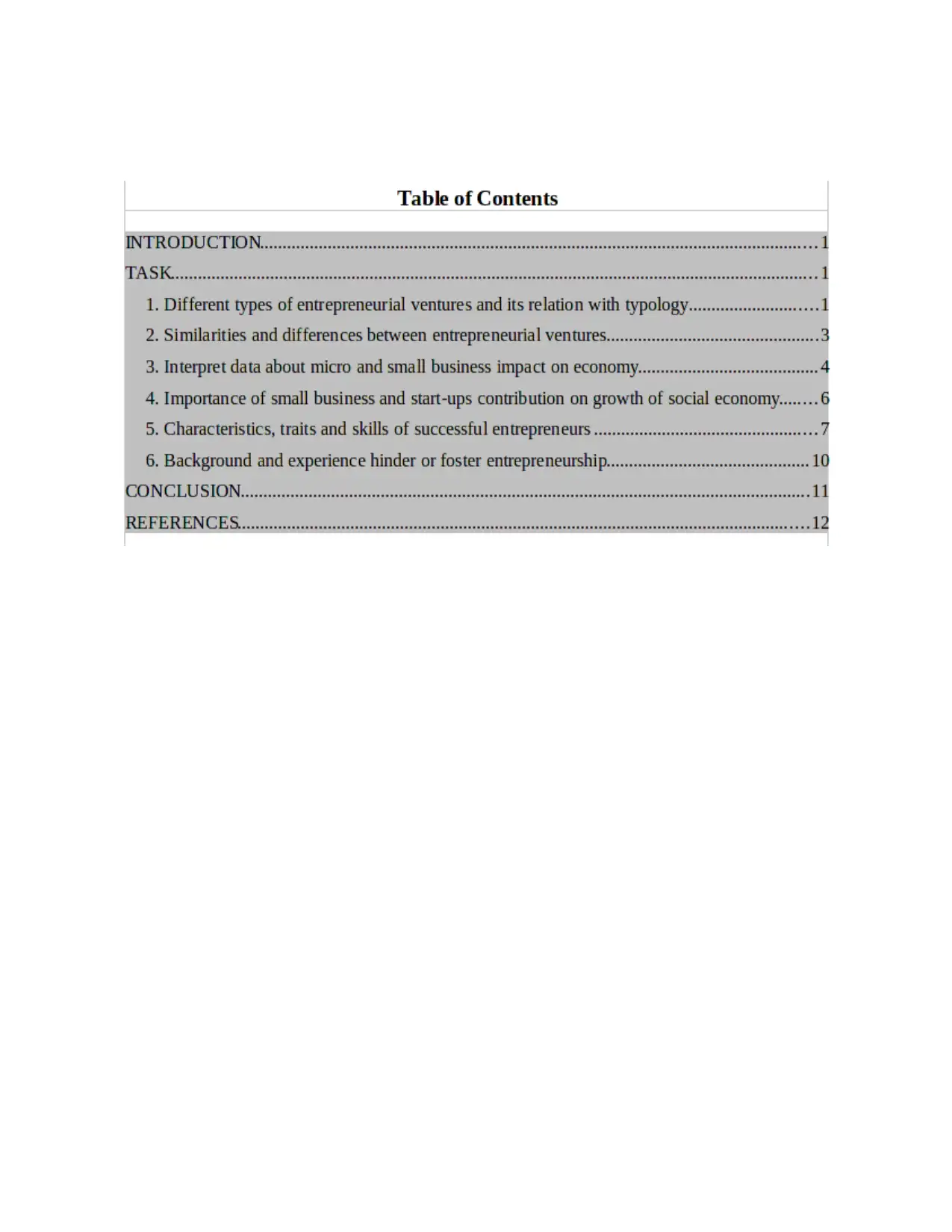

⊘ This is a preview!⊘
Do you want full access?
Subscribe today to unlock all pages.

Trusted by 1+ million students worldwide
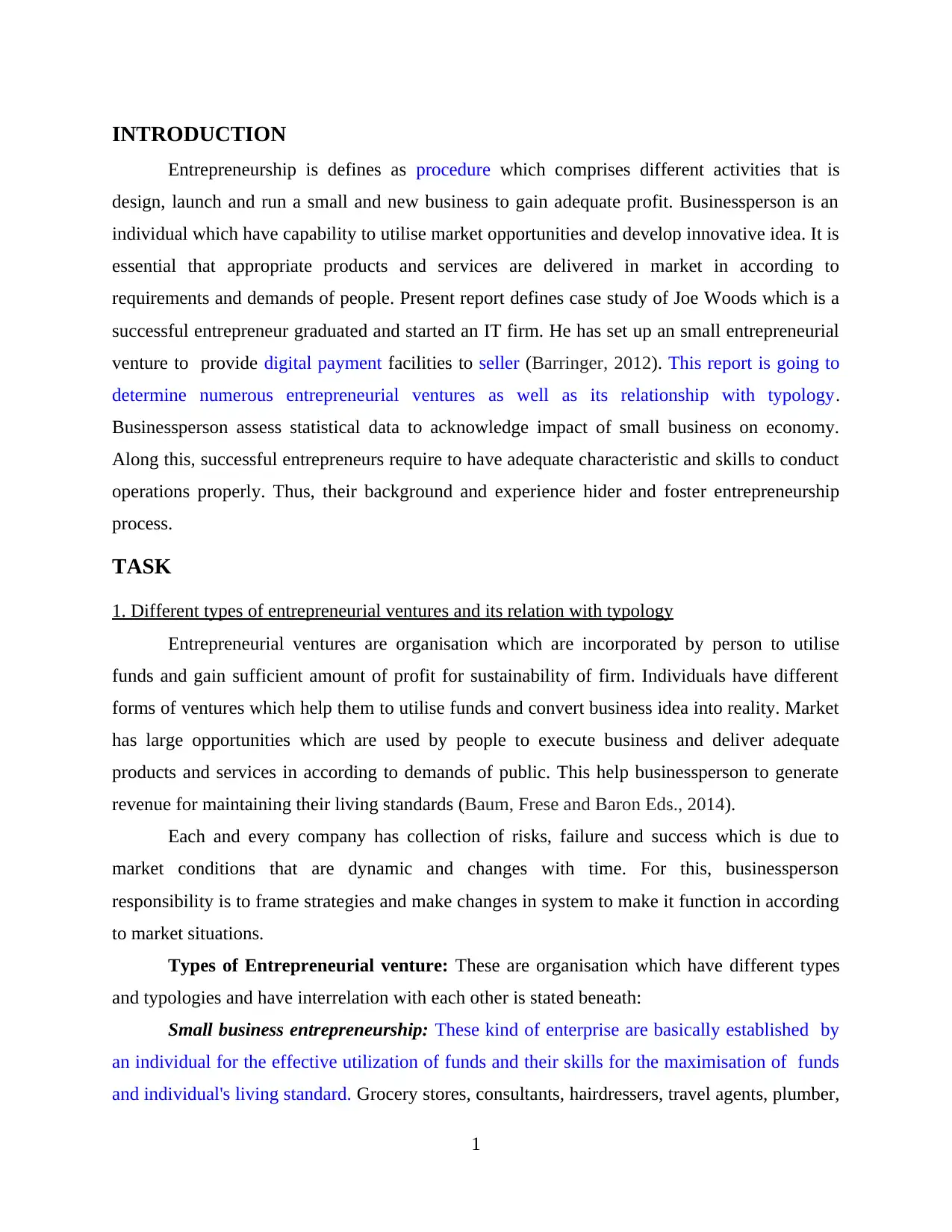
INTRODUCTION
Entrepreneurship is defines as procedure which comprises different activities that is
design, launch and run a small and new business to gain adequate profit. Businessperson is an
individual which have capability to utilise market opportunities and develop innovative idea. It is
essential that appropriate products and services are delivered in market in according to
requirements and demands of people. Present report defines case study of Joe Woods which is a
successful entrepreneur graduated and started an IT firm. He has set up an small entrepreneurial
venture to provide digital payment facilities to seller (Barringer, 2012). This report is going to
determine numerous entrepreneurial ventures as well as its relationship with typology.
Businessperson assess statistical data to acknowledge impact of small business on economy.
Along this, successful entrepreneurs require to have adequate characteristic and skills to conduct
operations properly. Thus, their background and experience hider and foster entrepreneurship
process.
TASK
1. Different types of entrepreneurial ventures and its relation with typology
Entrepreneurial ventures are organisation which are incorporated by person to utilise
funds and gain sufficient amount of profit for sustainability of firm. Individuals have different
forms of ventures which help them to utilise funds and convert business idea into reality. Market
has large opportunities which are used by people to execute business and deliver adequate
products and services in according to demands of public. This help businessperson to generate
revenue for maintaining their living standards (Baum, Frese and Baron Eds., 2014).
Each and every company has collection of risks, failure and success which is due to
market conditions that are dynamic and changes with time. For this, businessperson
responsibility is to frame strategies and make changes in system to make it function in according
to market situations.
Types of Entrepreneurial venture: These are organisation which have different types
and typologies and have interrelation with each other is stated beneath:
Small business entrepreneurship: These kind of enterprise are basically established by
an individual for the effective utilization of funds and their skills for the maximisation of funds
and individual's living standard. Grocery stores, consultants, hairdressers, travel agents, plumber,
1
Entrepreneurship is defines as procedure which comprises different activities that is
design, launch and run a small and new business to gain adequate profit. Businessperson is an
individual which have capability to utilise market opportunities and develop innovative idea. It is
essential that appropriate products and services are delivered in market in according to
requirements and demands of people. Present report defines case study of Joe Woods which is a
successful entrepreneur graduated and started an IT firm. He has set up an small entrepreneurial
venture to provide digital payment facilities to seller (Barringer, 2012). This report is going to
determine numerous entrepreneurial ventures as well as its relationship with typology.
Businessperson assess statistical data to acknowledge impact of small business on economy.
Along this, successful entrepreneurs require to have adequate characteristic and skills to conduct
operations properly. Thus, their background and experience hider and foster entrepreneurship
process.
TASK
1. Different types of entrepreneurial ventures and its relation with typology
Entrepreneurial ventures are organisation which are incorporated by person to utilise
funds and gain sufficient amount of profit for sustainability of firm. Individuals have different
forms of ventures which help them to utilise funds and convert business idea into reality. Market
has large opportunities which are used by people to execute business and deliver adequate
products and services in according to demands of public. This help businessperson to generate
revenue for maintaining their living standards (Baum, Frese and Baron Eds., 2014).
Each and every company has collection of risks, failure and success which is due to
market conditions that are dynamic and changes with time. For this, businessperson
responsibility is to frame strategies and make changes in system to make it function in according
to market situations.
Types of Entrepreneurial venture: These are organisation which have different types
and typologies and have interrelation with each other is stated beneath:
Small business entrepreneurship: These kind of enterprise are basically established by
an individual for the effective utilization of funds and their skills for the maximisation of funds
and individual's living standard. Grocery stores, consultants, hairdressers, travel agents, plumber,
1
Paraphrase This Document
Need a fresh take? Get an instant paraphrase of this document with our AI Paraphraser
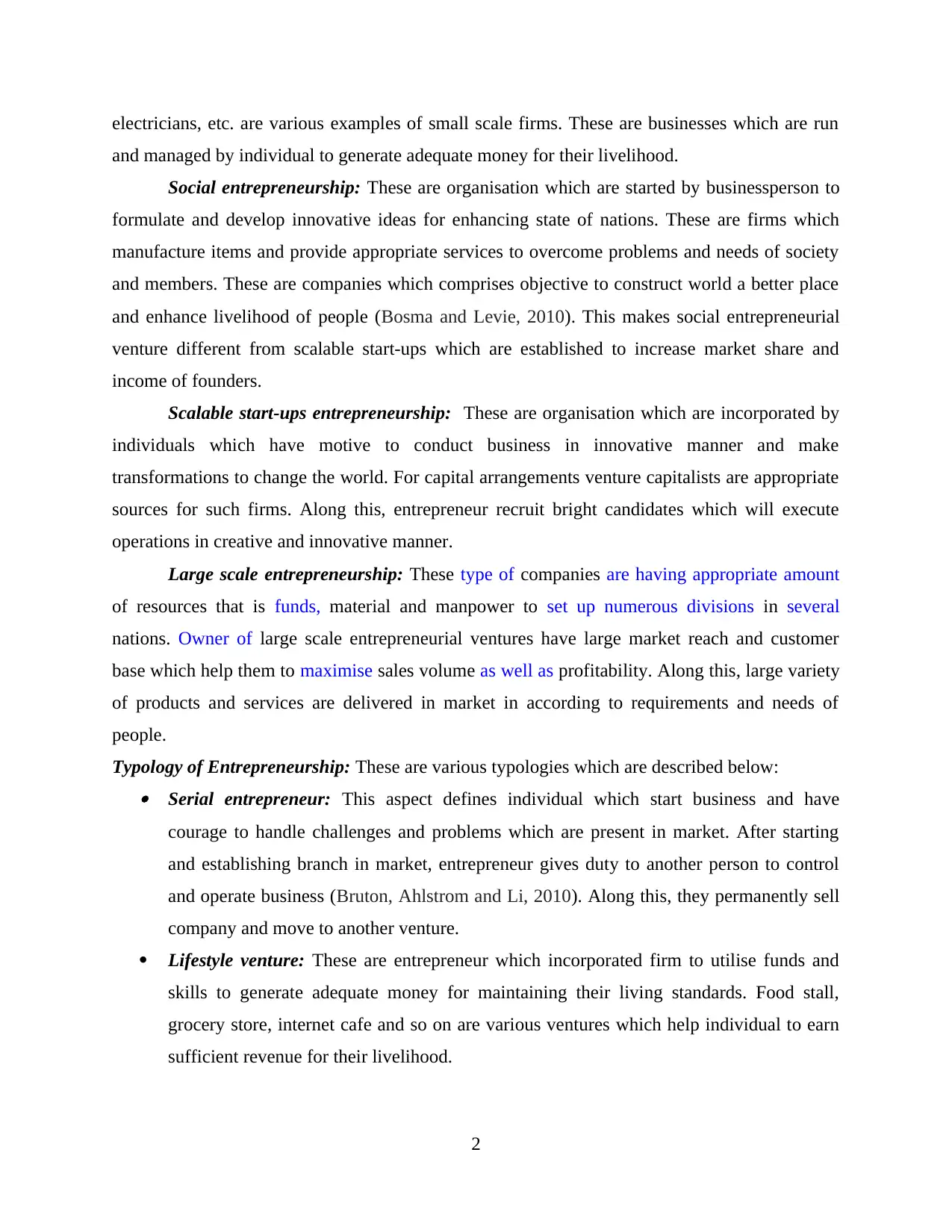
electricians, etc. are various examples of small scale firms. These are businesses which are run
and managed by individual to generate adequate money for their livelihood.
Social entrepreneurship: These are organisation which are started by businessperson to
formulate and develop innovative ideas for enhancing state of nations. These are firms which
manufacture items and provide appropriate services to overcome problems and needs of society
and members. These are companies which comprises objective to construct world a better place
and enhance livelihood of people (Bosma and Levie, 2010). This makes social entrepreneurial
venture different from scalable start-ups which are established to increase market share and
income of founders.
Scalable start-ups entrepreneurship: These are organisation which are incorporated by
individuals which have motive to conduct business in innovative manner and make
transformations to change the world. For capital arrangements venture capitalists are appropriate
sources for such firms. Along this, entrepreneur recruit bright candidates which will execute
operations in creative and innovative manner.
Large scale entrepreneurship: These type of companies are having appropriate amount
of resources that is funds, material and manpower to set up numerous divisions in several
nations. Owner of large scale entrepreneurial ventures have large market reach and customer
base which help them to maximise sales volume as well as profitability. Along this, large variety
of products and services are delivered in market in according to requirements and needs of
people.
Typology of Entrepreneurship: These are various typologies which are described below: Serial entrepreneur: This aspect defines individual which start business and have
courage to handle challenges and problems which are present in market. After starting
and establishing branch in market, entrepreneur gives duty to another person to control
and operate business (Bruton, Ahlstrom and Li, 2010). Along this, they permanently sell
company and move to another venture.
Lifestyle venture: These are entrepreneur which incorporated firm to utilise funds and
skills to generate adequate money for maintaining their living standards. Food stall,
grocery store, internet cafe and so on are various ventures which help individual to earn
sufficient revenue for their livelihood.
2
and managed by individual to generate adequate money for their livelihood.
Social entrepreneurship: These are organisation which are started by businessperson to
formulate and develop innovative ideas for enhancing state of nations. These are firms which
manufacture items and provide appropriate services to overcome problems and needs of society
and members. These are companies which comprises objective to construct world a better place
and enhance livelihood of people (Bosma and Levie, 2010). This makes social entrepreneurial
venture different from scalable start-ups which are established to increase market share and
income of founders.
Scalable start-ups entrepreneurship: These are organisation which are incorporated by
individuals which have motive to conduct business in innovative manner and make
transformations to change the world. For capital arrangements venture capitalists are appropriate
sources for such firms. Along this, entrepreneur recruit bright candidates which will execute
operations in creative and innovative manner.
Large scale entrepreneurship: These type of companies are having appropriate amount
of resources that is funds, material and manpower to set up numerous divisions in several
nations. Owner of large scale entrepreneurial ventures have large market reach and customer
base which help them to maximise sales volume as well as profitability. Along this, large variety
of products and services are delivered in market in according to requirements and needs of
people.
Typology of Entrepreneurship: These are various typologies which are described below: Serial entrepreneur: This aspect defines individual which start business and have
courage to handle challenges and problems which are present in market. After starting
and establishing branch in market, entrepreneur gives duty to another person to control
and operate business (Bruton, Ahlstrom and Li, 2010). Along this, they permanently sell
company and move to another venture.
Lifestyle venture: These are entrepreneur which incorporated firm to utilise funds and
skills to generate adequate money for maintaining their living standards. Food stall,
grocery store, internet cafe and so on are various ventures which help individual to earn
sufficient revenue for their livelihood.
2
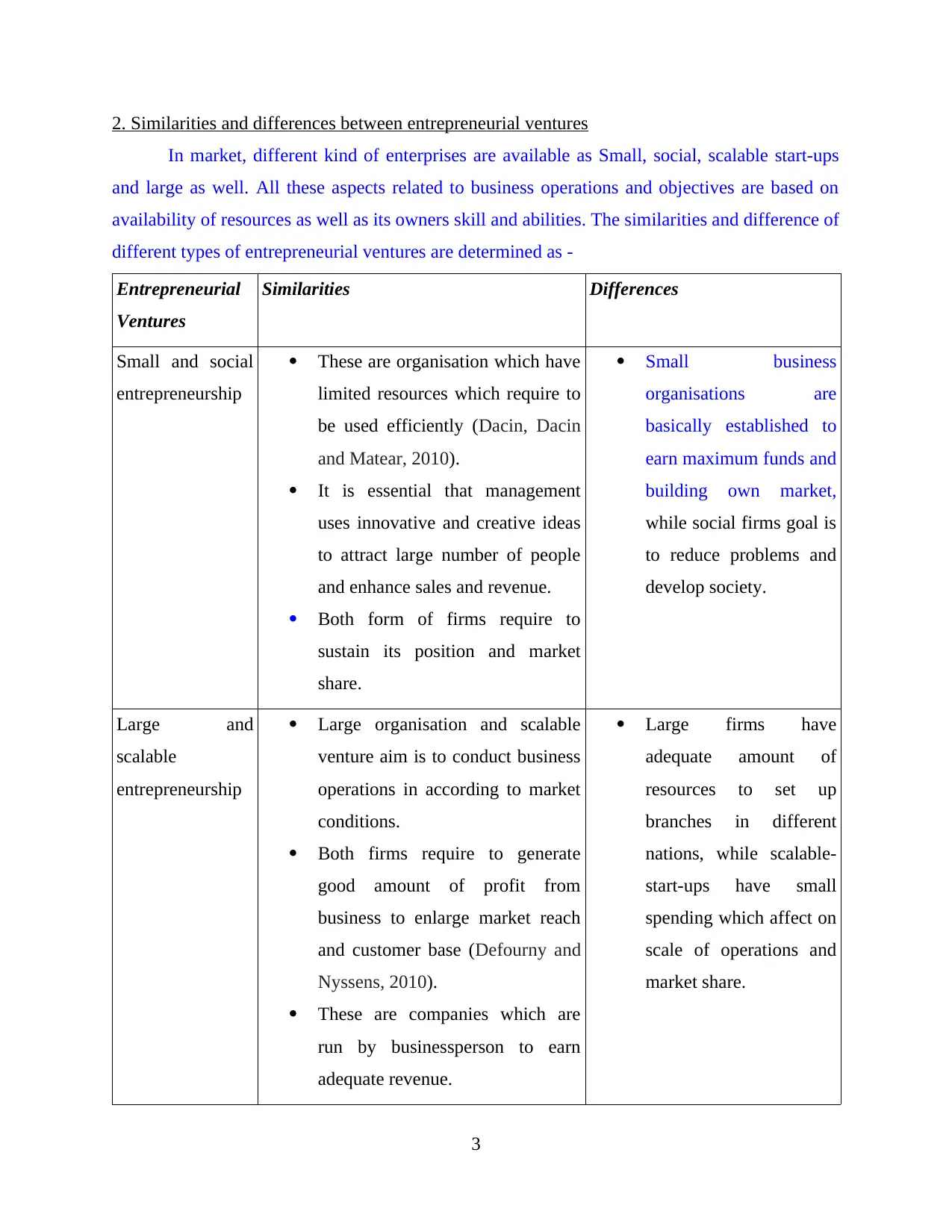
2. Similarities and differences between entrepreneurial ventures
In market, different kind of enterprises are available as Small, social, scalable start-ups
and large as well. All these aspects related to business operations and objectives are based on
availability of resources as well as its owners skill and abilities. The similarities and difference of
different types of entrepreneurial ventures are determined as -
Entrepreneurial
Ventures
Similarities Differences
Small and social
entrepreneurship
These are organisation which have
limited resources which require to
be used efficiently (Dacin, Dacin
and Matear, 2010).
It is essential that management
uses innovative and creative ideas
to attract large number of people
and enhance sales and revenue.
Both form of firms require to
sustain its position and market
share.
Small business
organisations are
basically established to
earn maximum funds and
building own market,
while social firms goal is
to reduce problems and
develop society.
Large and
scalable
entrepreneurship
Large organisation and scalable
venture aim is to conduct business
operations in according to market
conditions.
Both firms require to generate
good amount of profit from
business to enlarge market reach
and customer base (Defourny and
Nyssens, 2010).
These are companies which are
run by businessperson to earn
adequate revenue.
Large firms have
adequate amount of
resources to set up
branches in different
nations, while scalable-
start-ups have small
spending which affect on
scale of operations and
market share.
3
In market, different kind of enterprises are available as Small, social, scalable start-ups
and large as well. All these aspects related to business operations and objectives are based on
availability of resources as well as its owners skill and abilities. The similarities and difference of
different types of entrepreneurial ventures are determined as -
Entrepreneurial
Ventures
Similarities Differences
Small and social
entrepreneurship
These are organisation which have
limited resources which require to
be used efficiently (Dacin, Dacin
and Matear, 2010).
It is essential that management
uses innovative and creative ideas
to attract large number of people
and enhance sales and revenue.
Both form of firms require to
sustain its position and market
share.
Small business
organisations are
basically established to
earn maximum funds and
building own market,
while social firms goal is
to reduce problems and
develop society.
Large and
scalable
entrepreneurship
Large organisation and scalable
venture aim is to conduct business
operations in according to market
conditions.
Both firms require to generate
good amount of profit from
business to enlarge market reach
and customer base (Defourny and
Nyssens, 2010).
These are companies which are
run by businessperson to earn
adequate revenue.
Large firms have
adequate amount of
resources to set up
branches in different
nations, while scalable-
start-ups have small
spending which affect on
scale of operations and
market share.
3
⊘ This is a preview!⊘
Do you want full access?
Subscribe today to unlock all pages.

Trusted by 1+ million students worldwide
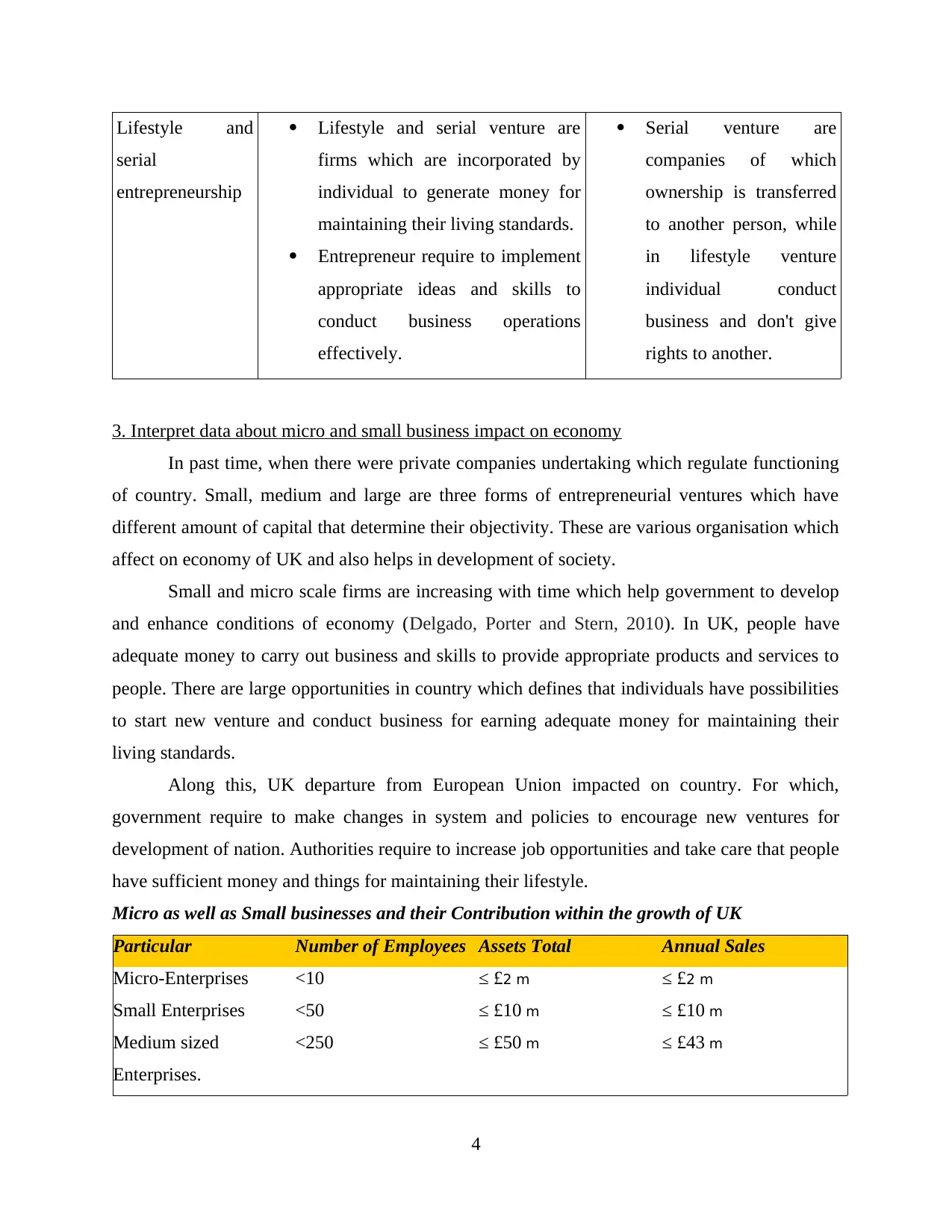
Lifestyle and
serial
entrepreneurship
Lifestyle and serial venture are
firms which are incorporated by
individual to generate money for
maintaining their living standards.
Entrepreneur require to implement
appropriate ideas and skills to
conduct business operations
effectively.
Serial venture are
companies of which
ownership is transferred
to another person, while
in lifestyle venture
individual conduct
business and don't give
rights to another.
3. Interpret data about micro and small business impact on economy
In past time, when there were private companies undertaking which regulate functioning
of country. Small, medium and large are three forms of entrepreneurial ventures which have
different amount of capital that determine their objectivity. These are various organisation which
affect on economy of UK and also helps in development of society.
Small and micro scale firms are increasing with time which help government to develop
and enhance conditions of economy (Delgado, Porter and Stern, 2010). In UK, people have
adequate money to carry out business and skills to provide appropriate products and services to
people. There are large opportunities in country which defines that individuals have possibilities
to start new venture and conduct business for earning adequate money for maintaining their
living standards.
Along this, UK departure from European Union impacted on country. For which,
government require to make changes in system and policies to encourage new ventures for
development of nation. Authorities require to increase job opportunities and take care that people
have sufficient money and things for maintaining their lifestyle.
Micro as well as Small businesses and their Contribution within the growth of UK
Particular Number of Employees Assets Total Annual Sales
Micro-Enterprises <10 ≤ £2 m ≤ £2 m
Small Enterprises <50 ≤ £10 m ≤ £10 m
Medium sized
Enterprises.
<250 ≤ £50 m ≤ £43 m
4
serial
entrepreneurship
Lifestyle and serial venture are
firms which are incorporated by
individual to generate money for
maintaining their living standards.
Entrepreneur require to implement
appropriate ideas and skills to
conduct business operations
effectively.
Serial venture are
companies of which
ownership is transferred
to another person, while
in lifestyle venture
individual conduct
business and don't give
rights to another.
3. Interpret data about micro and small business impact on economy
In past time, when there were private companies undertaking which regulate functioning
of country. Small, medium and large are three forms of entrepreneurial ventures which have
different amount of capital that determine their objectivity. These are various organisation which
affect on economy of UK and also helps in development of society.
Small and micro scale firms are increasing with time which help government to develop
and enhance conditions of economy (Delgado, Porter and Stern, 2010). In UK, people have
adequate money to carry out business and skills to provide appropriate products and services to
people. There are large opportunities in country which defines that individuals have possibilities
to start new venture and conduct business for earning adequate money for maintaining their
living standards.
Along this, UK departure from European Union impacted on country. For which,
government require to make changes in system and policies to encourage new ventures for
development of nation. Authorities require to increase job opportunities and take care that people
have sufficient money and things for maintaining their lifestyle.
Micro as well as Small businesses and their Contribution within the growth of UK
Particular Number of Employees Assets Total Annual Sales
Micro-Enterprises <10 ≤ £2 m ≤ £2 m
Small Enterprises <50 ≤ £10 m ≤ £10 m
Medium sized
Enterprises.
<250 ≤ £50 m ≤ £43 m
4
Paraphrase This Document
Need a fresh take? Get an instant paraphrase of this document with our AI Paraphraser
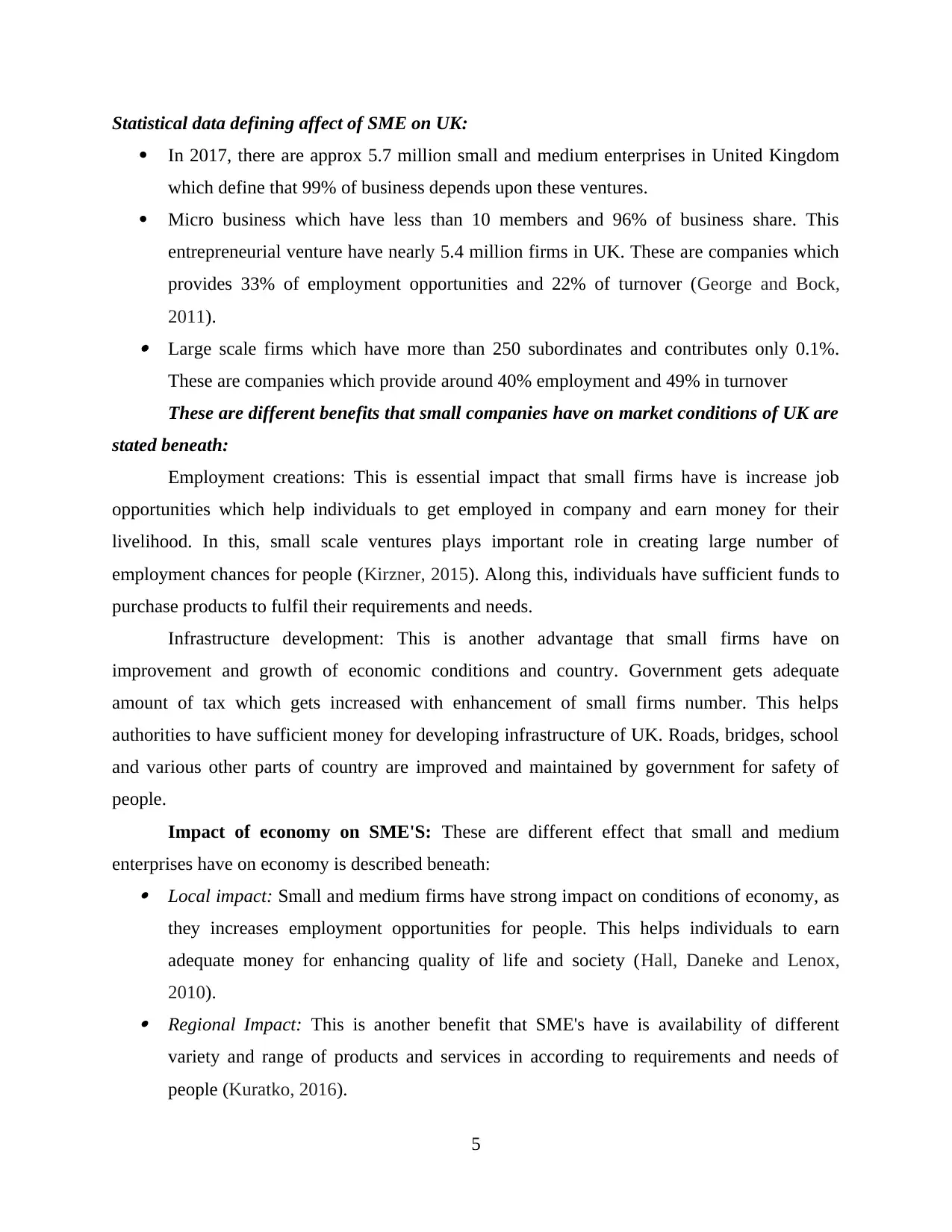
Statistical data defining affect of SME on UK:
In 2017, there are approx 5.7 million small and medium enterprises in United Kingdom
which define that 99% of business depends upon these ventures.
Micro business which have less than 10 members and 96% of business share. This
entrepreneurial venture have nearly 5.4 million firms in UK. These are companies which
provides 33% of employment opportunities and 22% of turnover (George and Bock,
2011). Large scale firms which have more than 250 subordinates and contributes only 0.1%.
These are companies which provide around 40% employment and 49% in turnover
These are different benefits that small companies have on market conditions of UK are
stated beneath:
Employment creations: This is essential impact that small firms have is increase job
opportunities which help individuals to get employed in company and earn money for their
livelihood. In this, small scale ventures plays important role in creating large number of
employment chances for people (Kirzner, 2015). Along this, individuals have sufficient funds to
purchase products to fulfil their requirements and needs.
Infrastructure development: This is another advantage that small firms have on
improvement and growth of economic conditions and country. Government gets adequate
amount of tax which gets increased with enhancement of small firms number. This helps
authorities to have sufficient money for developing infrastructure of UK. Roads, bridges, school
and various other parts of country are improved and maintained by government for safety of
people.
Impact of economy on SME'S: These are different effect that small and medium
enterprises have on economy is described beneath: Local impact: Small and medium firms have strong impact on conditions of economy, as
they increases employment opportunities for people. This helps individuals to earn
adequate money for enhancing quality of life and society (Hall, Daneke and Lenox,
2010). Regional Impact: This is another benefit that SME's have is availability of different
variety and range of products and services in according to requirements and needs of
people (Kuratko, 2016).
5
In 2017, there are approx 5.7 million small and medium enterprises in United Kingdom
which define that 99% of business depends upon these ventures.
Micro business which have less than 10 members and 96% of business share. This
entrepreneurial venture have nearly 5.4 million firms in UK. These are companies which
provides 33% of employment opportunities and 22% of turnover (George and Bock,
2011). Large scale firms which have more than 250 subordinates and contributes only 0.1%.
These are companies which provide around 40% employment and 49% in turnover
These are different benefits that small companies have on market conditions of UK are
stated beneath:
Employment creations: This is essential impact that small firms have is increase job
opportunities which help individuals to get employed in company and earn money for their
livelihood. In this, small scale ventures plays important role in creating large number of
employment chances for people (Kirzner, 2015). Along this, individuals have sufficient funds to
purchase products to fulfil their requirements and needs.
Infrastructure development: This is another advantage that small firms have on
improvement and growth of economic conditions and country. Government gets adequate
amount of tax which gets increased with enhancement of small firms number. This helps
authorities to have sufficient money for developing infrastructure of UK. Roads, bridges, school
and various other parts of country are improved and maintained by government for safety of
people.
Impact of economy on SME'S: These are different effect that small and medium
enterprises have on economy is described beneath: Local impact: Small and medium firms have strong impact on conditions of economy, as
they increases employment opportunities for people. This helps individuals to earn
adequate money for enhancing quality of life and society (Hall, Daneke and Lenox,
2010). Regional Impact: This is another benefit that SME's have is availability of different
variety and range of products and services in according to requirements and needs of
people (Kuratko, 2016).
5
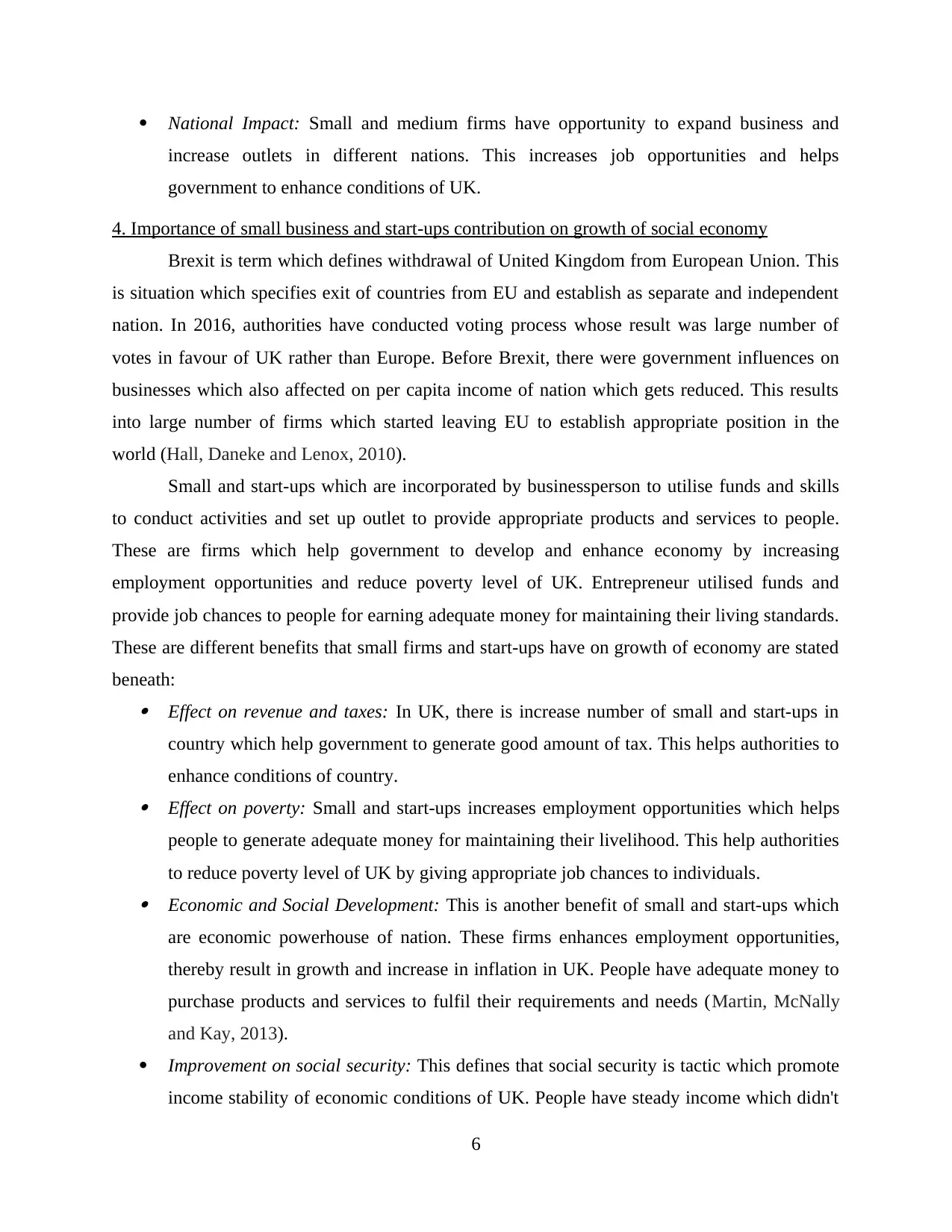
National Impact: Small and medium firms have opportunity to expand business and
increase outlets in different nations. This increases job opportunities and helps
government to enhance conditions of UK.
4. Importance of small business and start-ups contribution on growth of social economy
Brexit is term which defines withdrawal of United Kingdom from European Union. This
is situation which specifies exit of countries from EU and establish as separate and independent
nation. In 2016, authorities have conducted voting process whose result was large number of
votes in favour of UK rather than Europe. Before Brexit, there were government influences on
businesses which also affected on per capita income of nation which gets reduced. This results
into large number of firms which started leaving EU to establish appropriate position in the
world (Hall, Daneke and Lenox, 2010).
Small and start-ups which are incorporated by businessperson to utilise funds and skills
to conduct activities and set up outlet to provide appropriate products and services to people.
These are firms which help government to develop and enhance economy by increasing
employment opportunities and reduce poverty level of UK. Entrepreneur utilised funds and
provide job chances to people for earning adequate money for maintaining their living standards.
These are different benefits that small firms and start-ups have on growth of economy are stated
beneath: Effect on revenue and taxes: In UK, there is increase number of small and start-ups in
country which help government to generate good amount of tax. This helps authorities to
enhance conditions of country. Effect on poverty: Small and start-ups increases employment opportunities which helps
people to generate adequate money for maintaining their livelihood. This help authorities
to reduce poverty level of UK by giving appropriate job chances to individuals. Economic and Social Development: This is another benefit of small and start-ups which
are economic powerhouse of nation. These firms enhances employment opportunities,
thereby result in growth and increase in inflation in UK. People have adequate money to
purchase products and services to fulfil their requirements and needs (Martin, McNally
and Kay, 2013).
Improvement on social security: This defines that social security is tactic which promote
income stability of economic conditions of UK. People have steady income which didn't
6
increase outlets in different nations. This increases job opportunities and helps
government to enhance conditions of UK.
4. Importance of small business and start-ups contribution on growth of social economy
Brexit is term which defines withdrawal of United Kingdom from European Union. This
is situation which specifies exit of countries from EU and establish as separate and independent
nation. In 2016, authorities have conducted voting process whose result was large number of
votes in favour of UK rather than Europe. Before Brexit, there were government influences on
businesses which also affected on per capita income of nation which gets reduced. This results
into large number of firms which started leaving EU to establish appropriate position in the
world (Hall, Daneke and Lenox, 2010).
Small and start-ups which are incorporated by businessperson to utilise funds and skills
to conduct activities and set up outlet to provide appropriate products and services to people.
These are firms which help government to develop and enhance economy by increasing
employment opportunities and reduce poverty level of UK. Entrepreneur utilised funds and
provide job chances to people for earning adequate money for maintaining their living standards.
These are different benefits that small firms and start-ups have on growth of economy are stated
beneath: Effect on revenue and taxes: In UK, there is increase number of small and start-ups in
country which help government to generate good amount of tax. This helps authorities to
enhance conditions of country. Effect on poverty: Small and start-ups increases employment opportunities which helps
people to generate adequate money for maintaining their livelihood. This help authorities
to reduce poverty level of UK by giving appropriate job chances to individuals. Economic and Social Development: This is another benefit of small and start-ups which
are economic powerhouse of nation. These firms enhances employment opportunities,
thereby result in growth and increase in inflation in UK. People have adequate money to
purchase products and services to fulfil their requirements and needs (Martin, McNally
and Kay, 2013).
Improvement on social security: This defines that social security is tactic which promote
income stability of economic conditions of UK. People have steady income which didn't
6
⊘ This is a preview!⊘
Do you want full access?
Subscribe today to unlock all pages.

Trusted by 1+ million students worldwide
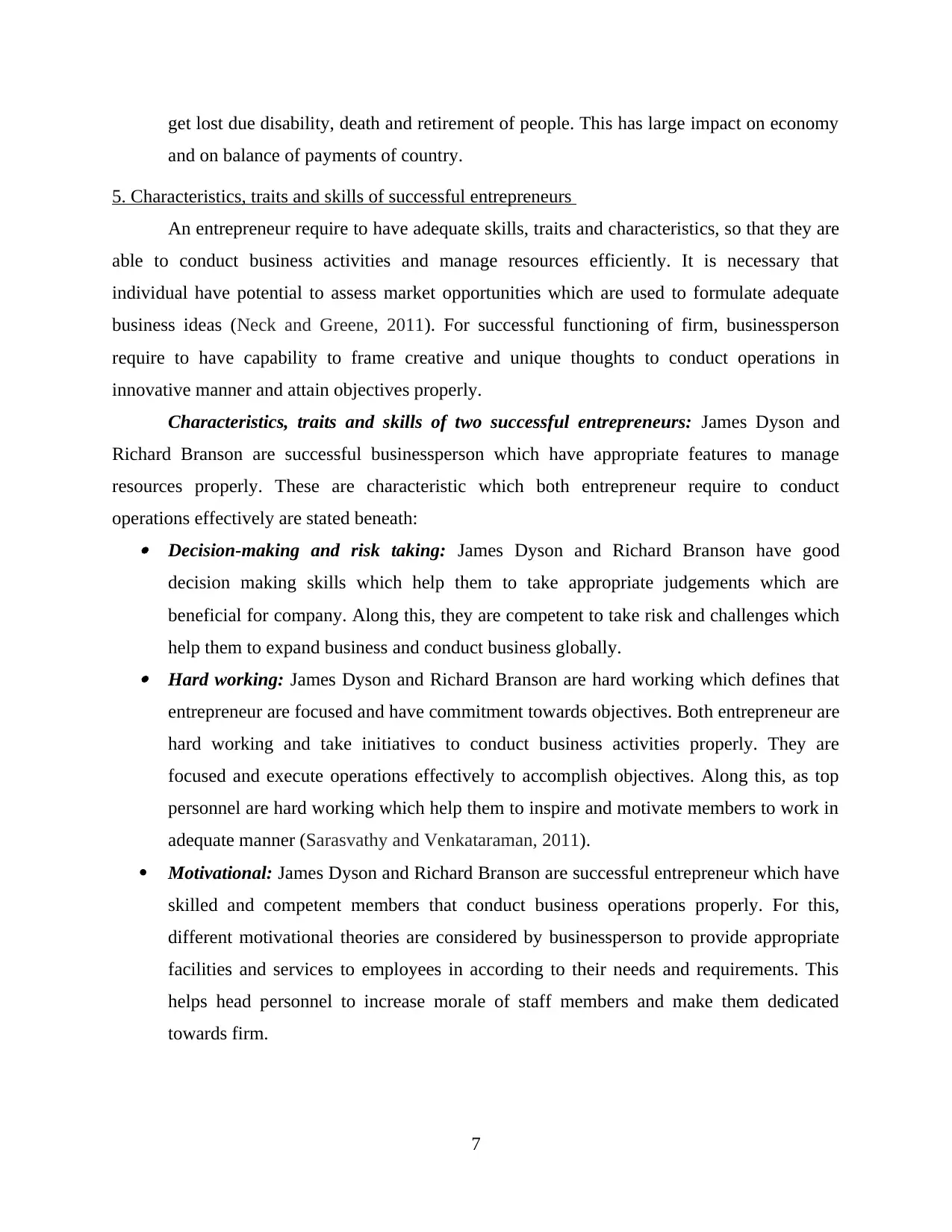
get lost due disability, death and retirement of people. This has large impact on economy
and on balance of payments of country.
5. Characteristics, traits and skills of successful entrepreneurs
An entrepreneur require to have adequate skills, traits and characteristics, so that they are
able to conduct business activities and manage resources efficiently. It is necessary that
individual have potential to assess market opportunities which are used to formulate adequate
business ideas (Neck and Greene, 2011). For successful functioning of firm, businessperson
require to have capability to frame creative and unique thoughts to conduct operations in
innovative manner and attain objectives properly.
Characteristics, traits and skills of two successful entrepreneurs: James Dyson and
Richard Branson are successful businessperson which have appropriate features to manage
resources properly. These are characteristic which both entrepreneur require to conduct
operations effectively are stated beneath: Decision-making and risk taking: James Dyson and Richard Branson have good
decision making skills which help them to take appropriate judgements which are
beneficial for company. Along this, they are competent to take risk and challenges which
help them to expand business and conduct business globally. Hard working: James Dyson and Richard Branson are hard working which defines that
entrepreneur are focused and have commitment towards objectives. Both entrepreneur are
hard working and take initiatives to conduct business activities properly. They are
focused and execute operations effectively to accomplish objectives. Along this, as top
personnel are hard working which help them to inspire and motivate members to work in
adequate manner (Sarasvathy and Venkataraman, 2011).
Motivational: James Dyson and Richard Branson are successful entrepreneur which have
skilled and competent members that conduct business operations properly. For this,
different motivational theories are considered by businessperson to provide appropriate
facilities and services to employees in according to their needs and requirements. This
helps head personnel to increase morale of staff members and make them dedicated
towards firm.
7
and on balance of payments of country.
5. Characteristics, traits and skills of successful entrepreneurs
An entrepreneur require to have adequate skills, traits and characteristics, so that they are
able to conduct business activities and manage resources efficiently. It is necessary that
individual have potential to assess market opportunities which are used to formulate adequate
business ideas (Neck and Greene, 2011). For successful functioning of firm, businessperson
require to have capability to frame creative and unique thoughts to conduct operations in
innovative manner and attain objectives properly.
Characteristics, traits and skills of two successful entrepreneurs: James Dyson and
Richard Branson are successful businessperson which have appropriate features to manage
resources properly. These are characteristic which both entrepreneur require to conduct
operations effectively are stated beneath: Decision-making and risk taking: James Dyson and Richard Branson have good
decision making skills which help them to take appropriate judgements which are
beneficial for company. Along this, they are competent to take risk and challenges which
help them to expand business and conduct business globally. Hard working: James Dyson and Richard Branson are hard working which defines that
entrepreneur are focused and have commitment towards objectives. Both entrepreneur are
hard working and take initiatives to conduct business activities properly. They are
focused and execute operations effectively to accomplish objectives. Along this, as top
personnel are hard working which help them to inspire and motivate members to work in
adequate manner (Sarasvathy and Venkataraman, 2011).
Motivational: James Dyson and Richard Branson are successful entrepreneur which have
skilled and competent members that conduct business operations properly. For this,
different motivational theories are considered by businessperson to provide appropriate
facilities and services to employees in according to their needs and requirements. This
helps head personnel to increase morale of staff members and make them dedicated
towards firm.
7
Paraphrase This Document
Need a fresh take? Get an instant paraphrase of this document with our AI Paraphraser
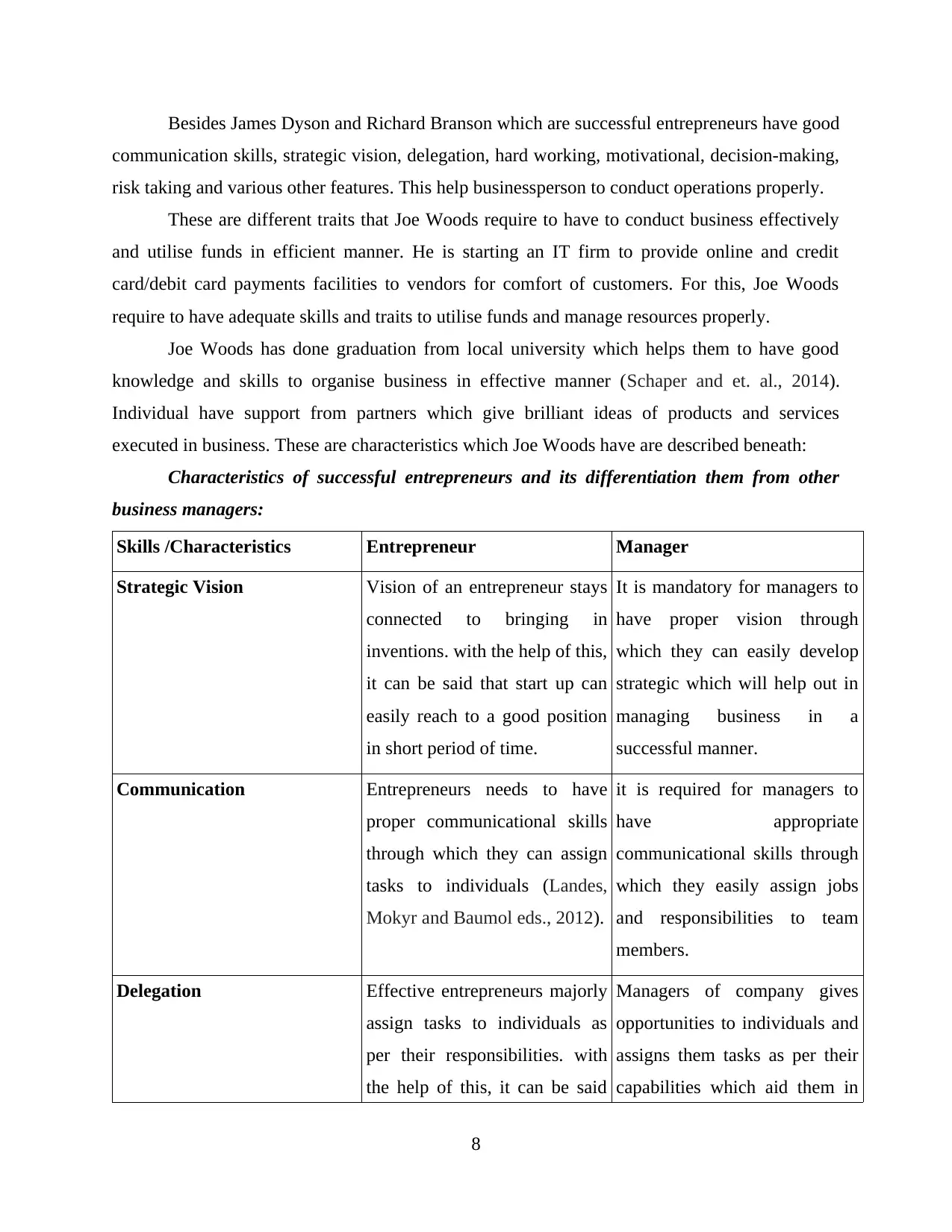
Besides James Dyson and Richard Branson which are successful entrepreneurs have good
communication skills, strategic vision, delegation, hard working, motivational, decision-making,
risk taking and various other features. This help businessperson to conduct operations properly.
These are different traits that Joe Woods require to have to conduct business effectively
and utilise funds in efficient manner. He is starting an IT firm to provide online and credit
card/debit card payments facilities to vendors for comfort of customers. For this, Joe Woods
require to have adequate skills and traits to utilise funds and manage resources properly.
Joe Woods has done graduation from local university which helps them to have good
knowledge and skills to organise business in effective manner (Schaper and et. al., 2014).
Individual have support from partners which give brilliant ideas of products and services
executed in business. These are characteristics which Joe Woods have are described beneath:
Characteristics of successful entrepreneurs and its differentiation them from other
business managers:
Skills /Characteristics Entrepreneur Manager
Strategic Vision Vision of an entrepreneur stays
connected to bringing in
inventions. with the help of this,
it can be said that start up can
easily reach to a good position
in short period of time.
It is mandatory for managers to
have proper vision through
which they can easily develop
strategic which will help out in
managing business in a
successful manner.
Communication Entrepreneurs needs to have
proper communicational skills
through which they can assign
tasks to individuals (Landes,
Mokyr and Baumol eds., 2012).
it is required for managers to
have appropriate
communicational skills through
which they easily assign jobs
and responsibilities to team
members.
Delegation Effective entrepreneurs majorly
assign tasks to individuals as
per their responsibilities. with
the help of this, it can be said
Managers of company gives
opportunities to individuals and
assigns them tasks as per their
capabilities which aid them in
8
communication skills, strategic vision, delegation, hard working, motivational, decision-making,
risk taking and various other features. This help businessperson to conduct operations properly.
These are different traits that Joe Woods require to have to conduct business effectively
and utilise funds in efficient manner. He is starting an IT firm to provide online and credit
card/debit card payments facilities to vendors for comfort of customers. For this, Joe Woods
require to have adequate skills and traits to utilise funds and manage resources properly.
Joe Woods has done graduation from local university which helps them to have good
knowledge and skills to organise business in effective manner (Schaper and et. al., 2014).
Individual have support from partners which give brilliant ideas of products and services
executed in business. These are characteristics which Joe Woods have are described beneath:
Characteristics of successful entrepreneurs and its differentiation them from other
business managers:
Skills /Characteristics Entrepreneur Manager
Strategic Vision Vision of an entrepreneur stays
connected to bringing in
inventions. with the help of this,
it can be said that start up can
easily reach to a good position
in short period of time.
It is mandatory for managers to
have proper vision through
which they can easily develop
strategic which will help out in
managing business in a
successful manner.
Communication Entrepreneurs needs to have
proper communicational skills
through which they can assign
tasks to individuals (Landes,
Mokyr and Baumol eds., 2012).
it is required for managers to
have appropriate
communicational skills through
which they easily assign jobs
and responsibilities to team
members.
Delegation Effective entrepreneurs majorly
assign tasks to individuals as
per their responsibilities. with
the help of this, it can be said
Managers of company gives
opportunities to individuals and
assigns them tasks as per their
capabilities which aid them in
8
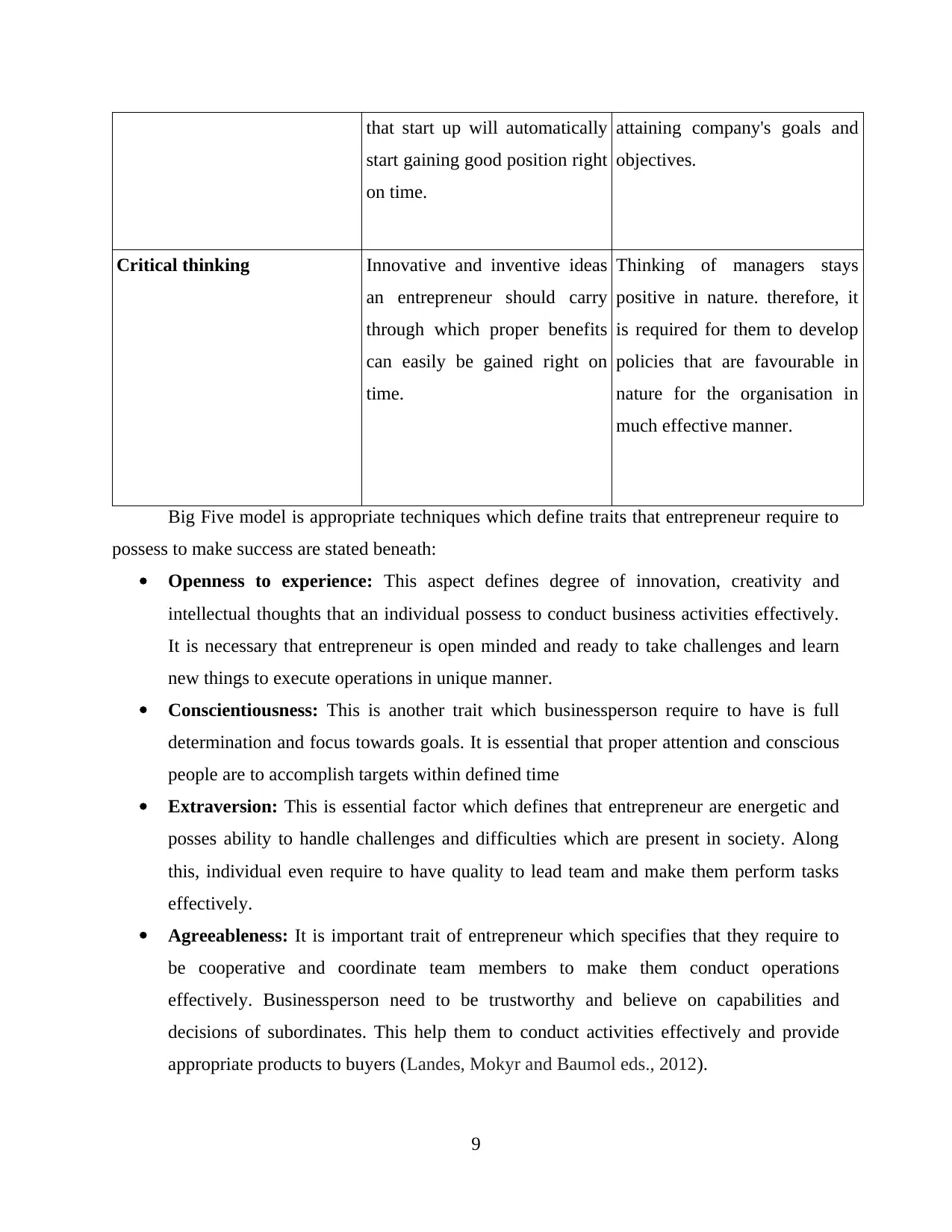
that start up will automatically
start gaining good position right
on time.
attaining company's goals and
objectives.
Critical thinking Innovative and inventive ideas
an entrepreneur should carry
through which proper benefits
can easily be gained right on
time.
Thinking of managers stays
positive in nature. therefore, it
is required for them to develop
policies that are favourable in
nature for the organisation in
much effective manner.
Big Five model is appropriate techniques which define traits that entrepreneur require to
possess to make success are stated beneath:
Openness to experience: This aspect defines degree of innovation, creativity and
intellectual thoughts that an individual possess to conduct business activities effectively.
It is necessary that entrepreneur is open minded and ready to take challenges and learn
new things to execute operations in unique manner.
Conscientiousness: This is another trait which businessperson require to have is full
determination and focus towards goals. It is essential that proper attention and conscious
people are to accomplish targets within defined time
Extraversion: This is essential factor which defines that entrepreneur are energetic and
posses ability to handle challenges and difficulties which are present in society. Along
this, individual even require to have quality to lead team and make them perform tasks
effectively.
Agreeableness: It is important trait of entrepreneur which specifies that they require to
be cooperative and coordinate team members to make them conduct operations
effectively. Businessperson need to be trustworthy and believe on capabilities and
decisions of subordinates. This help them to conduct activities effectively and provide
appropriate products to buyers (Landes, Mokyr and Baumol eds., 2012).
9
start gaining good position right
on time.
attaining company's goals and
objectives.
Critical thinking Innovative and inventive ideas
an entrepreneur should carry
through which proper benefits
can easily be gained right on
time.
Thinking of managers stays
positive in nature. therefore, it
is required for them to develop
policies that are favourable in
nature for the organisation in
much effective manner.
Big Five model is appropriate techniques which define traits that entrepreneur require to
possess to make success are stated beneath:
Openness to experience: This aspect defines degree of innovation, creativity and
intellectual thoughts that an individual possess to conduct business activities effectively.
It is necessary that entrepreneur is open minded and ready to take challenges and learn
new things to execute operations in unique manner.
Conscientiousness: This is another trait which businessperson require to have is full
determination and focus towards goals. It is essential that proper attention and conscious
people are to accomplish targets within defined time
Extraversion: This is essential factor which defines that entrepreneur are energetic and
posses ability to handle challenges and difficulties which are present in society. Along
this, individual even require to have quality to lead team and make them perform tasks
effectively.
Agreeableness: It is important trait of entrepreneur which specifies that they require to
be cooperative and coordinate team members to make them conduct operations
effectively. Businessperson need to be trustworthy and believe on capabilities and
decisions of subordinates. This help them to conduct activities effectively and provide
appropriate products to buyers (Landes, Mokyr and Baumol eds., 2012).
9
⊘ This is a preview!⊘
Do you want full access?
Subscribe today to unlock all pages.

Trusted by 1+ million students worldwide
1 out of 15
Related Documents
Your All-in-One AI-Powered Toolkit for Academic Success.
+13062052269
info@desklib.com
Available 24*7 on WhatsApp / Email
![[object Object]](/_next/static/media/star-bottom.7253800d.svg)
Unlock your academic potential
Copyright © 2020–2026 A2Z Services. All Rights Reserved. Developed and managed by ZUCOL.





